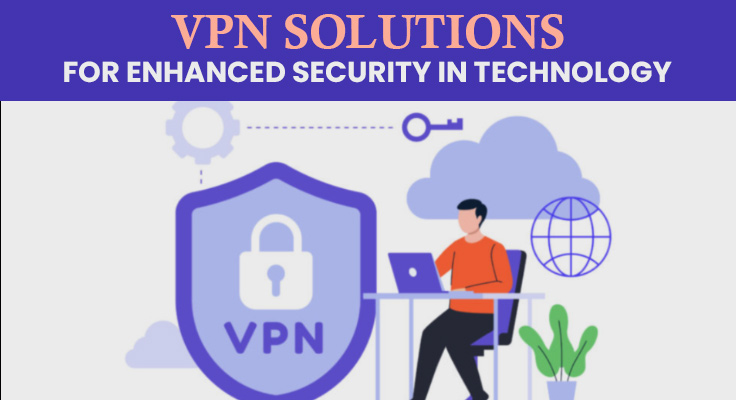Securing sensitive business data has become more crucial than ever with the rise of remote and hybrid work policies. However, even in the absence of these policies, many organizations have employees who access company systems from unsecured Wi-Fi spots in airports, hotels, and coffee shops at some point.
Combine this with an increase in sophisticated phishing attempts, and it becomes evident why organizations face risks such as data breaches, financial losses, and damage to their reputation. To mitigate the risks associated with unsecured remote connections, businesses can turn to Virtual Private Networks (VPN) solutions.
These solutions act as a technological shield by masking user locations and encrypting confidential communications, ensuring data remains secure and unaltered during transmission. We will discuss how VPN technology can improve network protection.
Why does a Business Need a VPN?
1. Data Security
Authorized parties can understand encrypted data. Encryption scrambles readable data, making it appear random to anyone who intercepts it, including attackers. Encryption functions similarly to a “secret code.”
In a VPN, encrypted connections are established between devices, often using the IPsec or SSL/TLS encryption protocols. All devices that connect to the VPN create encryption keys. These keys encode and decode information sent between the devices. Network connections may have a slight increase in latency due to this process, resulting in slower network traffic (learn more about VPN performance).
VPN connections remain private even when traversing public Internet infrastructure due to encryption. Together with a secure browser, this is the basis of cybersecurity solutions for companies. Brave or Tor are used as a secure browser. You can read more about whether Brave browser is safe and what risks it cannot cope with at the link above. Together, these internet privacy tools offer better security and reliability.
2. Digital Privacy
Traditional VPNs prioritize security to some extent, but user privacy isn’t always their primary concern. Some providers retain logs containing user activities, connection times, and even IP addresses, making them susceptible to leaks and hacks. Without strict no-log policies, the confidentiality of user activities can’t be guaranteed. When you choose online security measures, look for those tools that do not store information about you and your users. Fortunately, today there is a VPN with a no-log policy.
3. Increased Productivity
Even when employees are not in the office, they require access to the company’s network-specific services. Fortunately, high-speed internet is widely accessible through cellular data networks and ubiquitous Wi-Fi hotspots. By utilizing a VPN on this internet access, private network access becomes universally available. The combination of a VPN and mobile internet empowers employees to boost productivity by accessing enterprise applications even when they are away from the office.
4. Cost Savings
Your business can easily connect from anywhere using a VPN. This will save costs associated with long-distance phone calls, eliminate the need for expensive long-distance leased lines, and offload support costs. Using a VPN is an essential tool in your business toolbox for safeguarding your company’s privacy and security.
5. Cost-Effective Security
A VPN enhances your security and is definitely worth the investment. Prices may vary but are usually quite affordable. Choosing a VPN is a cost-effective way to instantly improve your company’s security.
6. Network Resilience
Most organizations not only need security but also require a resilient network that guarantees smooth operations and proper business continuity even in the face of unforeseen challenges.
Traditional VPNs, structured around a centralized architecture, can be vulnerable to outages if their primary server or data center encounters issues. Without efficient failover mechanisms, dropped connections may occur without automatic rerouting. This results in user downtime and operational disruptions.
7. Bypass Geographical Restrictions
Some remote workers may require access to geo-restricted resources, like specific websites, social media sites, or services limited to certain regions, depending on their workplace. To bypass these restrictions, remote workers can use VPNs, which route their internet traffic through servers in different geographic locations.
Types of VPN

Different types of Virtual Private Networks (VPNs) exist, each with its own set of features, protocols, and use cases. The main VPN types include:
- Remote Access VPN: Designed for individual users or devices to securely connect to a corporate network over the internet. Remote workers access company resources such as files, email, and applications while ensuring data security. Remote access VPNs commonly use SSL/TLS and IPsec protocols.
- Site-to-Site VPN: Used to securely connect entire networks or multiple locations like branch offices over the internet. They establish secure tunnels between two or more physical locations, enabling resource and data sharing. Site-to-site VPNs usually employ IPsec, GRE, and MPLS protocols.
- SSL VPN: Secure Socket Layer (SSL) VPNs utilize SSL/TLS protocols to securely provide remote access to web-based applications and services. They enable secure access to corporate intranets, webmail, and other web applications without requiring client software installation.
- IPsec VPN: Internet Protocol Security (IPsec) is a protocol used for securing Internet communication. It can be used in both remote access and site-to-site VPN configurations, offering robust data encryption and authentication.
- PPTP, L2TP, and L2TP/IPsec: These are older VPN protocols with varying levels of security and performance. PPTP (Point-to-Point Tunneling Protocol) is less secure and less commonly used nowadays. L2TP (Layer 2 Tunneling Protocol) and L2TP/IPsec combine L2TP with IPsec to enhance security.
- WireGuard: WireGuard is a relatively new and lightweight VPN protocol known for its simplicity and high performance. It aims to be faster and more secure than older protocols like OpenVPN and IPsec.
Conclusion
Safeguarding sensitive business data has increasingly become crucial amid the rise of remote and hybrid work models. To achieve this, businesses are turning to robust solutions, a business VPN that offers advanced security, enhanced privacy, and network resilience.
A good VPN utilizes a variety of advanced security features such as SSO, MFA, end-to-end encryption, ACLs, and SSH. Its zero-config deployment, cross-platform compatibility, and use of the Wireguard protocol make it both fast and easy to deploy and use.
Also Read: 12 FinTech Quotes That Portray the Evolution of Financial Services








